First announced during Sony’s press conference at E3 2016, Hideo Kojima’s DEATH STRANDING has been the subject of rampant speculation. The game has been teased extensively since then, but precious little information regarding what exactly Kojima’s game is about, or frankly, what it is, has been divulged to the public.
Earlier this week, however, we finally got some important answers. DEATH STRANDING is slated for a November 2019 release, and it will still be playable on PS4 despite the looming arrival of the PlayStation 5. Alongside the release date, the principal cast and their roles have been revealed: Margaret Qualley (THE LEFTOVERS, THE NICE GUYS, as well as the upcoming ONCE UPON A TIME IN HOLLYWOOD), Tommie Earl Jenkins (HOW TO GET AWAY WITH MURDER, GENERAL HOSPITAL), and director Nicolas Winding Refn will be joining a stacked lineup that already includes Norman Reedus, Mads Mikkelsen, and Academy Award-winning director Guillermo del Toro.
Yet even with a heaping of much-needed proper nouns and the first real look at the game’s HUD, the latest trailer for DEATH STRANDING (which clocks in at just under nine minutes) has left us scratching our heads harder than ever. Is this a stealth game, a shooter, a horror-hybrid of the two, or some completely different genre altogether? What is the actual gameplay loop? What’s with all the babies? Why is Norman Reedus blue now? Will he also be able to shoot lightning from his fingertips? Why are so many acclaimed directors getting in front of the camera? What does Kojima want???
After thorough analysis, the intrepid writers of Merry-Go-Round Magazine are here to set the record straight. Or maybe we won’t. We’re honestly just as confused as you, but that’s not going to stop us from publishing our definitive takes on what DEATH STRANDING may or may not be.
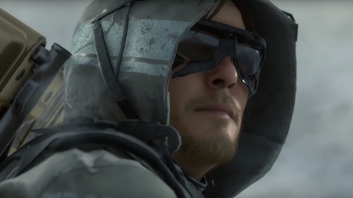
Ed
We’ve known for a while now that Sam Porter Bridges (Reedus) works in some capacity for the United Cities of America, an organization trying to establish some semblance of order in DEATH STRANDING’s bleak hellscape. The new trailer elaborates further: Following an unspecified calamity, the UCA wants to reconnect its disparate urban centers. However, a domestic terrorist group known as the Homo-Demens (thank God and Sony for blank checks) is trying to prevent this by instigating the arrival of Beached Things (BTs), invisible creatures that cause all sorts of chaotic phenomena.
Curious is the fact that none of the landscapes these factions operate within bear any resemblance to America, or at least the continental United States that is the sigil of BRIDGES, the outfit that Sam is a member of. The glacial planes and rugged crags that have been featured in multiple gameplay previews remind me most of the volcanic terrain seen in PROMETHEUS, shot in Iceland, a country which, after double-checking, I determined does not exist within the USA.
The trenches of World War I, introduced in this trailer, will also be an arena for Sam to tangle with enemies in. Avid history students will recall that the infamous Western Front of WWI weaved its way through the territories of France, Belgium, Luxembourg and Germany—none of which, as it turns out, share any borders with the United States, either.
Cliff (Mikkelsen) even promises the viewer near the end of the trailer that they can go anywhere . . . even the Moon. Indeed, it seems that in Sam’s quest to “reunite a broken nation,” he will be able to travel to any location (even if that location isn’t on Earth), except for the nation in question. It’s a puzzling contradiction at first, until you realize that Kojima is in fact setting the stage for a brilliantly scathing commentary on the gradual geographic displacement of American interests over the past century.
“Rebuilding America isn’t going to get rid of the BTs,” Sam laments, “Long as they’re still around, there’s no escaping it.” The ghostly specters linger, much like the damage caused by American interventionism abroad. Even if the US returned to its isolationist roots overnight, the effects of Cold War foreign policy will continue to be felt on a global level for decades to come. Kojima is no stranger to criticizing the American military-industrial complex, and as is laid out clear as daylight in his latest trailer, DEATH STRANDING is obviously no exception to this common theme.
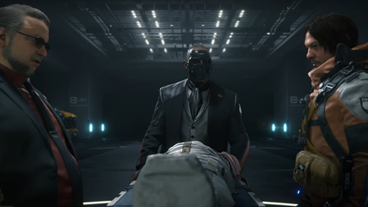
Steven
The United States is either falling or has fallen, particularly affected by the “division” between people and their inability to form “connections” with each other. There’s a group of secessionist terrorists that might also just be libertarians, and malevolent otherworldly beings that arrive with a rain that causes organic life to age rapidly. All of the dialogue and quite a few of the set pieces seem to point toward this game being an extended metaphor for social media and technology and how they seem to foment existing rifts between people, causing them to be “unconnected.”
Norman Reedus is Kojima’s Mary-Sue insert, tasked with rebuilding America and otherwise reconnecting the populace with each other. It seems like Papa Hideo is tired of Twitter flame wars and cancellation culture and fake news, and wants to tell a story venting his frustrations about the whole thing.
The thing is, with Kojima it’s tough to tell what’s a pointed argument and what’s been included cause it’s either hilarious or he thinks it looks cool. MGS2 largely ended up being a statement on media narratives; it was famously advertised as another Solid Snake adventure, only to give players the ol’ switcheroo after an hour, making them play as Raiden for the rest of the game. But also in that game the player can look at pictures of bikini girls to regain health and made a few jokes about Raiden’s pee pee.
Until the game comes out it’ll be tough to nail down what exactly represents what, but what can already be said with certainty is that DEATH STRANDING is a coded narrative about the brutal Boomer-Millennial conflicts that continue to ravage the internet to this day.

Sergio
It’s really not much of a surprise that an untethered video-game auteur would deliver his very own SOUTHLAND TALES. It also explains why a director running off a blank check would go so hog wild as to cast other directors as in-game characters. With Guillermo del Toro and Nicolas Winding Refn rounding out a cast of industry stalwarts, it’s easy to ignore the fact that Kojima is a galaxy-brain director first, and a crowd-pleaser second.
It’s because of this that DEATH STRANDING reads as a study of creation. From Norman Reedus carrying around a tube-baby to Mads Mikkelsen’s lullaby-singing father figure, there’s an abundance of the abject and the organic, the all-consuming slimes and trench warfare contributing to the game’s overwhelming sense of the life-and-death cycle.
But what really tickles my funny bone is the concept of Reedus transporting his mechanical embryo through an Icelandic tundra, with hazmat-clad corporate goons hot on his tail. I’m not going to jump the gun and claim that Hideo Kojima is visualizing childbirth (although the story of a man trying to give natural birth against the will of terrorists does sound tempting), but I do think that there’s an undeniable connective tissue between the baby, Reedus’ protective instincts, and the choice casting of two directors in the game’s key roles.
More specifically, I think the baby is representative of Kojima’s entire body of work, with Reedus serving as a Kojima surrogate, a protective baby-daddy who’ll brave the most grueling environments to keep his child from the corporate hands of a meddling studio. It’s Kojima’s entire life summarized in one fell swoop, culminating in his sudden departure from Konami—Hell, if the baby is a metaphor for his unfinished SILENT HILLS (a Guillermo del Toro collaboration, no less), then we can only expect the worst fate.
It’s precisely why we hear the line “good thing it’s raining, even they [the Homo-Demens] know better than to mess with BTs.” If I’m allowed any further leniency in my already-far-fetched over-analysis of the DEATH STRANDING trailer, then I’d make the claim that the human enemies (and Mikkelsen as the core antagonist) serve as all the oppositionary forces to the master game developer that is Hideo Kojima.
But at this point, safely sequestered in his own private Tokyo-studio, the only thing that can bring down Kojima is the man himself. And mind you, none of that is to say that DEATH STRANDING will be good. As I already stated above, it could very well be his SOUTHLAND TALES. But what it most certainly will be, is his most interesting (and likely most personal) project in a decades-long career.
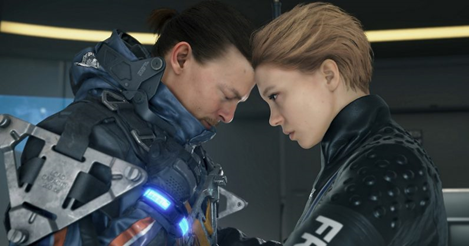
Alec
Though it may have been a vestigial limb of the gameplay experience for some, METAL GEAR SOLID V: THE PHANTOM PAIN’s multiplayer was wildly ambitious for its time. Each PHANTOM PAIN player was responsible for their own Mother Base, which they developed and expanded to attain more weapons and gadgets. Players could invade another’s Mother Base in an effort to either steal supplies or disarm their nuclear weapon located at the core. While still completely unnecessary, Kojima cheekily issued a challenge offering online players a secret cutscene if all nuclear weapons across all Mother Bases were disarmed. PC players went the other direction and maxed out the number of possessed nukes which, funnily enough, triggered the cutscene anyway. It was a neat little aspect of the game that was largely ignored, but still retained that ol’ Kojima spice of being enigmatic yet still reflective of an ever-present reality, and players answered in kind.
With all these references to social media being made by many involved, I’m willing to bet that the quasi-multiplayer component of DEATH STRANDING will be much more prevalent than MGSV’s. Now stick with me, the meaning of this strong theme of “connections” is beginning to lean towards one thing: they fuck…or it’s at least an allusion to fucking. Think about it! Why this whole big obsession with babies? This post-America dystopia the game takes place in, I reckon, will be similar to the one in CHILDREN OF MEN, though much more devastating. The Timefall rain that plagues this ruined Earth causes rapid aging of all life it touches, so it, in turn, is robbing the populace of the vigor to fuck!
Kojima and others working on the game keep purporting that DEATH STRANDING strives to do away with the common philosophy of online gaming. For ages, we’ve been playing shooters that grant players the satisfaction of having fragged someone from across the world. It has become so common that it’s ubiquitous with the culture and games in and of themselves, many shoehorning in half-baked multiplayer concepts so as not to tank in the vicious industry. Instead, DEATH STRANDING is going to turn that on its head and offer players incentives to “connect” rather than kill each other. Like an incredibly cooler version of LinkedIn or, dare I say, FarmersOnly.
Higgs (Troy Baker) says “It’s so hard to form connections when you can’t shake hands.” No one really has an idea what exactly that entails, but is it so hard to take that beautiful notion just one step further. In lieu of you ending another player’s life, imagine you and another player created another life to combat the efforts of these death strands. What if a “body count” actually meant a body count?
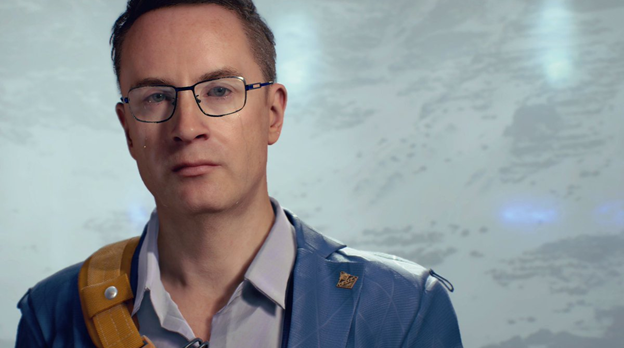
Thomas
With trailers like this, and really any sort of experientially similar audio-visual experience at large, getting lost in the weeds trying to determine the literal meaning of what’s in front of us is part of the fun, but usually not where the strongest returns derive from. Didn’t this very publication call traditional discussion around TWIN PEAKS: THE RETURN redundant? Who wants to really parse apart something like BEYOND THE BLACK RAINBOW? Are James Ferraro art installations something to understand, or something to feel? All of this is to say that while, sure, the… Homo-Demens (gotta briefly bring attention back to that one)… and the references to a fallen and/or rapidly falling America imply some sort of commentary on modern affairs and politics, and the likelihood of DEATH STRANDING having not-so-subtle reflexive meta-commentary on Kojima’s work at large is almost a certainty, let’s be honest with ourselves and admit that this game is probably going to require a brain as galaxian as Kojima’s to make any semblance of sense of. As such, at least from where I’m standing, the trailer seems most relevant to discussions of ego death, a concept as psychedelic as the visuals we’re presented with.
According to the brave psychonauts who came before us, ego death is “when the entire sense of self disappears and one is left with nothing but the awareness that everything in the universe is connected.” As you’ll notice, “connection” is a chief preoccupation of the trailer, whether it’s the more literal connections between Reedus and his glorified baby backpack, turns of phrase such as highlighting “those bound to Hades,” or the closing thoughts involving how human beings are supposed to come together. It seems as if the pervasive connection that ego death promises is at least the goal, if not an a priori reality of our world of story. What’s more, original LSD proponent Timothy Leary defined the concept as “a complete transcendence – beyond words, beyond space-time, beyond self.” This certainly seems to fit in with the extremely disparate settings and scenarios we’re presented with, from the trenches of World War I to post-apocalyptic metropoles. It seems as if some transcendent state of consciousness would be needed to see all of them as related and relevant, and bolstered by the fact that Sam Porter Bridges returns late in the trailer in a shade of suicidal blue, it can be assumed DEATH STRANDING eventually does away with its protagonist’s initial sense of self and belonging.
While perhaps more of a stretch, the infant motif also fits in with the theory of ego death being an engaging way to interact with the trailer, as the wide-eyed jouissance experienced at the earliest stages of childhood in some ways is the state ego death strives to return to, completely free of the learned cynicism of adolescence and eager once again to form connections with everything that crosses our path. It’s also worth pointing out that Kojima’s use of high-profile Hollywood talent in a medium that still has detractors challenging its legitimacy is a sort of ego death in its own right, Guillermo del Toro and Nicolas Winding Refn two directors many would consider auteurs throwing creative control to the wind and letting themselves be digitally rendered avatars to be meticulously controlled by another. This is just about as dramatic a 180 as you could conceive, eliminating the sense of self inherent in agency and forming a connection between two mediums that the ignorant still consider on opposite sides of the high art spectrum.
Now you’ll notice all of this doesn’t offer any actual conclusions of what I think DEATH STRANDING is about. I’d bet all the beer in my fridge that it’s going to be something entirely in the eyes of the beholder, and I’d second Sergio’s thoughts above that the whole thing could be a shit-show of the highest production value. But with this many signs pointing to ego death as a thematic umbrella, I think we’d do best to take (what I have to assume to be) Kojima’s magnum opus as a colorful, cosmic journey, putting aside our understanding of traditional genre, story, and the fundamental presumptions of “gaming” at large, and instead putting ourselves back to square one, letting the synapses form connections wherever and however they will.








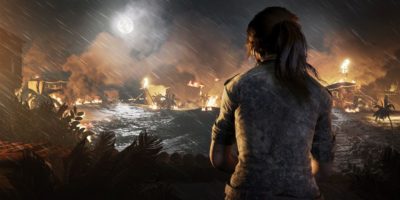




[…] difficult to say what the publisher actually has in the chamber. THE LAST OF US: PART II and DEATH STRANDING are each console-sellers in their own right, but we only have a release date for the latter (and […]